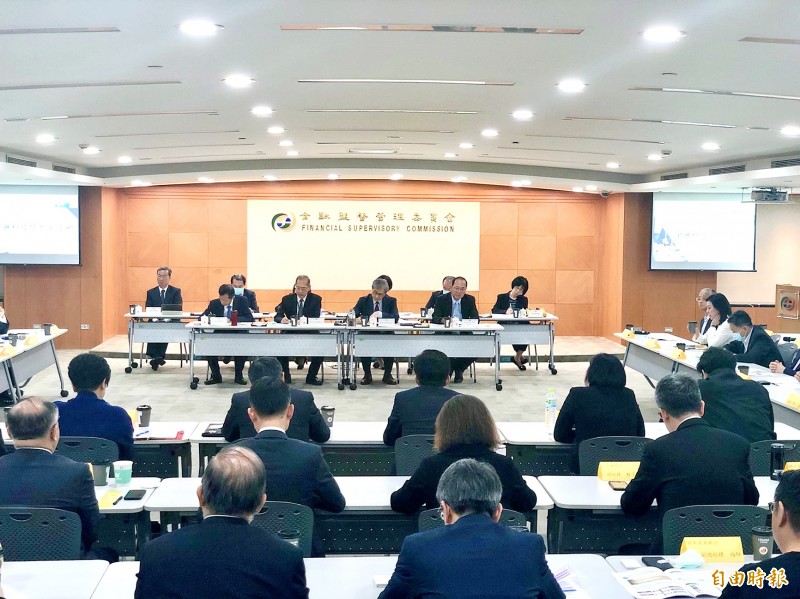《TAIPEI TIMES》Financial firms call for rule changes

Financial Supervisory Commission officials, led by Chairman Thomas Huang, and representatives from 39 financial firms hold a meeting in New Taipei City yesterday. Photo: Kelson Wang, Taipei Times
By Kao Shih-ching / Staff reporter
Local financial firms yesterday called on the Financial Supervisory Commission to deregulate rules on consumer identity authentication, know-your-customer (KYC) data sharing and financial technology sandbox trials, saying that it would help boost their business development in Taiwan.
At a meeting organized by commission Chairman Thomas Huang (黃天牧) in New Taipei City, four local banks, Yuanta Securities Investment Trust Co (元大投信) and the Chinese National Futures Association (CNFA, 期貨公會) urged the commission to let firms adopt a more effective method of verifying consumers’ identities than using Citizen Digital Certificates.
As it is not convenient for people to have a card reader for the Citizen Digital Certificate, the government could consider allowing banks to use one-time passwords for clients’ online transactions, DBS Bank Taiwan (星展台灣) general manager Lim Him-chuan (林鑫川) said.
Web-only bank Line Bank Ltd (連線商業銀行) general manager Morris Huang (黃以孟) followed up by saying that virtual banks concentrate on mobile services, but mobile devices cannot read plastic cards.
Representatives from another Web-only bank, Next Bank (將來銀行), and Yuanta Securities Investment urged the regulator to let companies cooperate with electronic payment companies with regards to identity authentication, as e-payment firms such as Jkos Pay (街口支付) conduct solid authentication.
“It is impossible to have a method of identity authentication that prevents fraud entirely,” CNFA chairman Falco Mi (糜以雍) said, adding that some fraud rings have allegedly used fake photographs, which confuse inspectors.
“The commission should let companies decide which method to use to ward off fraudsters. Companies that face higher risks would naturally adopt a more severe approach,” Mi said.
Representatives from EasyCard Corp (悠遊卡), E.Sun Commercial Bank (玉山銀行), Yuanta Financial Holding Co (元大金控) and Capital Securities Corp (群益金鼎證券) also urged the regulator to let them share KYC data to save time and money, or to establish a consumer data platform where companies could access and conduct KYC checks.
“More clients are applying to open accounts online amid the coronavirus outbreak, but when clients come from nowhere but the Internet, we cannot really figure out who they are, and it takes a much longer time conducting KYC [checks] than at our physical units,” Capital Securities president Alex Chia (賈中道) said.
“KYC is similar to the infrastructure of the business, and companies should work together. It is important for us to figure out how to share KYC data without breaching personal information protections,” Yuanta Financial chief digital development officer Kuo Mei-ling (郭美伶) said.
Regarding sandbox experiments conducted together by financial firms and non-financial companies, financial firms must take full responsibility if there are accidents or fraud under the current regulations, which has prevented many firms from getting involved, CTBC Financial president Daniel Wu (吳一揆) said.
To keep in line with its peers in Japan and South Korea, the commission could divide the non-financial firms into groups of different business scales, and large non-financial firms should take some responsibility, too, Wu said.
Shin Kong Life Insurance Co (新光人壽) vice chairwoman Catherine Lee (李紀珠) said that the commission should assign a third-party agency to helping insurers exchange their data with medical institutions, which would make insurance claims more convenient for clients.
It would encourage clients to choose medical insurance policies or other protection-type products, Lee said.
新聞來源:TAIPEI TIMES

















